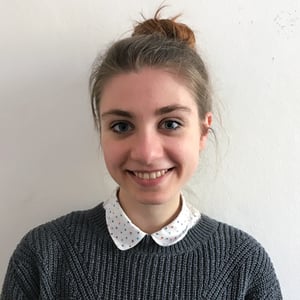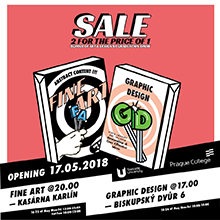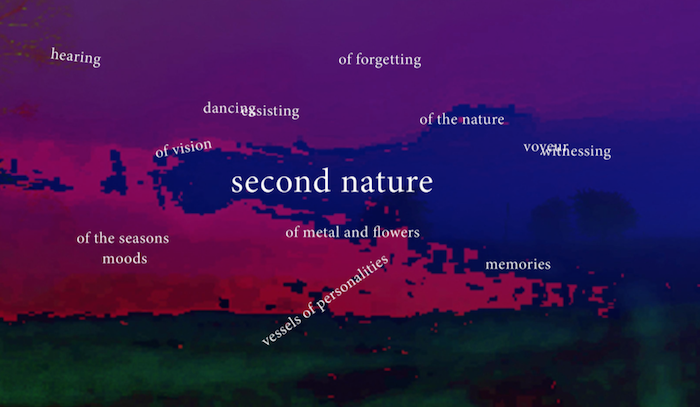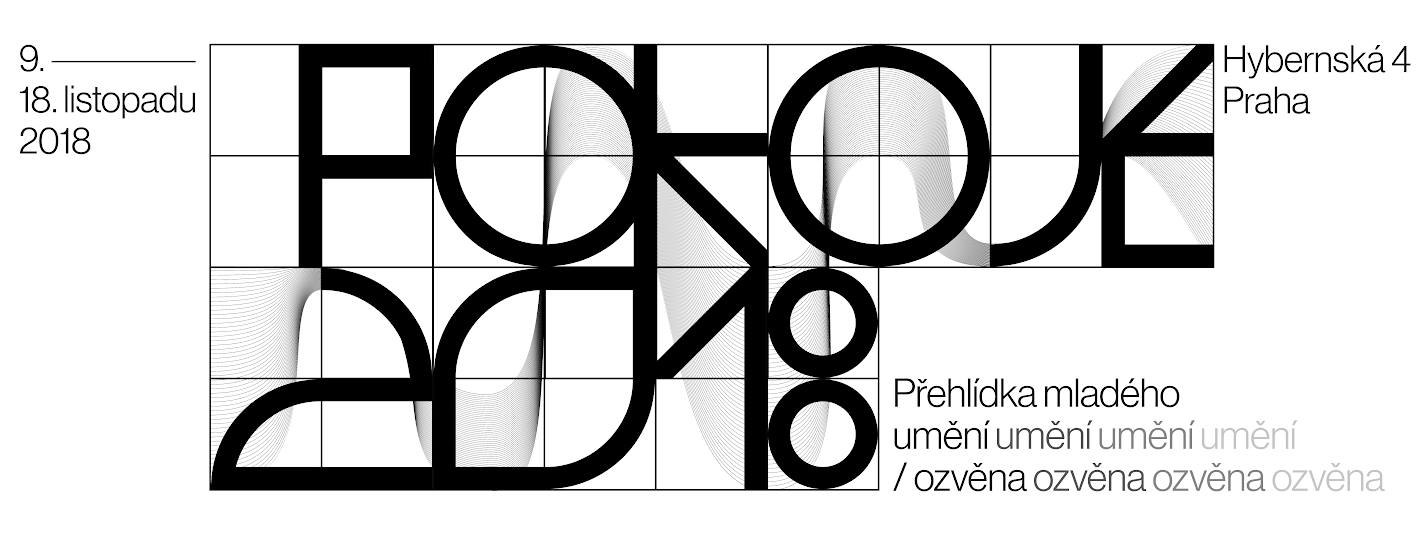Quiet Noise, Subtle Fury: An Interview with Lamija Čehajić
By Matthew Butler on 24 April 2019 11:04
Last updated on 30 September 2020 15:09
Lamija Čehajić, BA (Hons) Fine Art Experimental Media student in her final semester, recently won the jury award at Sarajevska zima (Sarajevo Winter), a Bosnian international festival for young artists in the field of fine arts, film and literature.
 We spoke with Lamija about what this prize means, art, war, and her studies in Prague.
We spoke with Lamija about what this prize means, art, war, and her studies in Prague.
First of all, congratulations on winning the Jury Award for the festival. Can you tell us what your work was about?
The annual topic for the festival was “Noise and Fury”, and I had to somehow respond to this topic. I realised that most of my work was almost an antithesis to this because it is about what comes after the violence. This is something that I have been working with since September 2017. After taking part in the exhibition 4+4, I discovered this is something I am really interested in.
It helped me to reflect on the context from which I came from, which is postwar Bosnia. Recovering after the war, and how we as a generation that never had to deal with war, how do we deal with trauma that is almost inheritable, which is felt but not fully understood. So my work has been about this, and the work I put up as part of the festival in February also continued from this, especially as the topic itself was about something violent, about something loud. So my work comes as something soft, that mends, that tries to heal.
Is this a theme that runs through your work? What is your interest in healing as a concept?
I think that it comes as a natural response, which carries a personal responsibility. That I happen to be in a space that somehow the previous generation could not deal with in a constructive manner. They could not recuperate on their own after the war. That the generation that is coming in has to really take care of this. A lot of my interest came from my theoretical reading on memory, politics and collective memory. So I am also interested in how memory enters the political domain, so I feel like my work has the political aspects as well, but also aesthetically.
For example I work with wool because this is something that is important for the context where I am from. Wool is something that heals and keeps warms. For me using something that extends from the land allows me to talk about collective memory that is almost molecularly distilled into the landscape.
The problem is how to position the work in the public domain, or even present it to the public. That is currently my biggest problem. How do I present my work in a space because it is kind of small and not that visible.
Do you feel like your studies have been able to help you to formulate your positions in any way?
The academic approach to teaching and learning about art has been very useful. I feel that it facilitated an independence, and forced me to be an independent creator. The classes here have been structured in a manner that does not allow a lot of skills with guidance. So everyone needs to really invest their time and interest in doing what they are primarily interested in, and for me this was very good, and it really prepared me to work on my own when I finish. It has given me the skills to find the skills I need to make something. And of course having a more personal relationship with the lecturers and everyone helps a lot and this is probably the most valuable thing I got from this programme. A lot of people don’t understand this. There are amazing people who work here and they have so many connections to the outside world, in the industry and external to Prague College. A lot of people don’t understand that this is a part of the learning process. For me this was very important, and through this I got an internship, and now I have a second one. All of it comes through having established a relationship with the lecturers. Because I got recommendations and so on. Some people just don’t appreciate this so much.
And now you are finishing your Bachelor's degree and final show. Do you have plans to continue to work as an artist? How do you feel about your future working in this field?
In September I have enrolled in Charles University, because I realised that I wanted a space where I could have deadlines about reading and writing. This will be a second Bachelor’s degree. For me this pattern really works with a lot of research based art. Then I would like to do a Masters programme in something like critical study, or research based art. And then maybe onto a PhD and continue in the academic path. But I will make my work as well. I realize that I need to go back to Bosnia as well. This is perhaps the way how to make the mending that is in my work enter the public sphere. I would like to open my own space, with a gallery or contemporary art center with a residency in Bosnia. I see myself as going between Prague and Bosnia, living the artist life between. But I think I need to have a base there as well and open something, because the contemporary art scene is very weak there, basically non existent. And I feel that I have the motivation and knowledge to do so. So I am now doing some initial research on how to do it. This is really the peak purpose of my work.
How is Prague for you as a city of art and culture?
Prague has been very accepting. Because I was born here and it has also felt like an alternative to back home. When it comes to art I don’t necessarily see my work as something that could be widely accepted here. Which is something that troubles me a bit.
Why is that?
I think that it’s because my work is about a certain context that it not so understood, and also visually it’s not loud enough in the popular Czech art scene.
Do people in Bosnia have a better understanding of what you are trying to do?
I don’t think they have a formal understanding that comes from a formal education but they relate to it on a personal level, more intuitive. That with my show it was difficult for them to understand why it was art but they understood what it was I was trying to convey. That’s possibly one of the reasons I want to open a space. Not to show my work but to have a platform where discourse can be made. Now there is no discourse and in a couple of years I hope to be a person that has enough knowledge to make something where people come and there is a debate going on.
Congratulations again and we look forward to seeing your graduate show in May. Best of luck to you in the future.
- School of Art, Design & Media (433)
- Student Life (331)
- School of Business, Management & Technology (268)
- Global Engagement (141)
- Research & Creative Practice (95)
- Seminars & Workshops (73)
- Master Speakers Series (70)
- Exhibitions (69)
- New Students (64)
- Academic Partners (58)
- Alumni (58)
- Living Futures (52)
- Graduation (47)
- Visiting Artist Lecture Series (44)
- Conferences (37)
- Digital Campus (22)
- Professional Partners (14)
- Study Exchanges (14)
- University News (11)
- Industry Network (9)
- School of Education (9)
- Media Innovation Technology Series (8)
- Press Release (8)
- Erasmus+ (3)
- Student Societies (1)
- May 2025 (2)
- April 2025 (4)
- February 2025 (4)
- January 2025 (5)
- December 2024 (2)
- November 2024 (1)
- October 2024 (2)
- September 2024 (6)
- August 2024 (4)
- July 2024 (4)
- May 2024 (1)
- April 2024 (1)
- March 2024 (2)
- February 2024 (1)
- January 2024 (3)
- December 2023 (1)
- November 2023 (3)
- October 2023 (1)
- September 2023 (1)
- August 2023 (1)
- July 2023 (2)
- June 2023 (1)
- April 2023 (2)
- March 2023 (2)
- February 2023 (3)
- January 2023 (2)
- December 2022 (5)
- November 2022 (3)
- September 2022 (4)
- August 2022 (2)
- July 2022 (2)
- June 2022 (1)
- May 2022 (7)
- April 2022 (5)
- March 2022 (5)
- February 2022 (3)
- January 2022 (1)
- December 2021 (7)
- November 2021 (8)
- October 2021 (6)
- September 2021 (5)
- August 2021 (8)
- July 2021 (3)
- June 2021 (3)
- May 2021 (2)
- April 2021 (5)
- March 2021 (3)
- February 2021 (4)
- January 2021 (2)
- December 2020 (5)
- November 2020 (8)
- October 2020 (2)
- September 2020 (3)
- August 2020 (1)
- July 2020 (3)
- June 2020 (4)
- May 2020 (7)
- April 2020 (6)
- March 2020 (5)
- February 2020 (2)
- January 2020 (7)
- December 2019 (5)
- November 2019 (12)
- October 2019 (9)
- September 2019 (6)
- July 2019 (1)
- June 2019 (1)
- May 2019 (14)
- April 2019 (10)
- March 2019 (7)
- February 2019 (16)
- January 2019 (8)
- December 2018 (2)
- November 2018 (6)
- October 2018 (10)
- September 2018 (3)
- August 2018 (2)
- July 2018 (3)
- June 2018 (10)
- May 2018 (12)
- April 2018 (9)
- March 2018 (5)
- February 2018 (3)
- January 2018 (8)
- December 2017 (4)
- November 2017 (9)
- October 2017 (7)
- September 2017 (3)
- July 2017 (4)
- June 2017 (3)
- May 2017 (8)
- April 2017 (8)
- March 2017 (13)
- February 2017 (11)
- January 2017 (6)
- December 2016 (3)
- November 2016 (18)
- October 2016 (9)
- September 2016 (8)
- August 2016 (4)
- July 2016 (9)
- June 2016 (3)
- May 2016 (6)
- April 2016 (5)
- March 2016 (78)
- February 2016 (4)
- January 2016 (4)
- December 2015 (6)
- November 2015 (9)
- October 2015 (5)
- September 2015 (6)
- August 2015 (1)
- July 2015 (4)
- June 2015 (1)
- May 2015 (3)
- April 2015 (11)
- March 2015 (6)
- February 2015 (6)
- January 2015 (6)
- December 2014 (1)
- November 2014 (17)
- October 2014 (4)
- September 2014 (8)
- August 2014 (5)
- July 2014 (1)
- June 2014 (10)
- May 2014 (25)
- April 2014 (32)
- March 2014 (53)
- February 2014 (25)
- January 2014 (10)
- December 2013 (10)
- October 2013 (1)
- September 2013 (1)
- July 2013 (4)
- June 2013 (2)
- March 2013 (2)
- February 2013 (74)
- January 2013 (6)
- December 2012 (13)
- November 2012 (3)
- October 2012 (5)
- September 2012 (156)
- July 2012 (1)
- November 2011 (1)
- November 2010 (1)
- November 2009 (1)
- November 2008 (4)
- September 2008 (1)
- July 2008 (1)
- June 2008 (4)
- May 2008 (2)
- April 2008 (3)
- March 2008 (2)
- February 2008 (1)
- December 2007 (1)
- October 2007 (1)
- August 2007 (1)
- July 2007 (1)
- June 2007 (4)
- May 2007 (1)
- April 2007 (2)
- March 2007 (3)
- January 2007 (1)
- November 2006 (1)
- December 2005 (1)
- November 2005 (1)
- October 2005 (1)
- August 2005 (1)
- May 2005 (1)
You May Also Like
These Related Articles

BA (Hons) Graphic Design Final Show 2018

BA (Hons) Fine Art Experimental Media Final Show 2018

